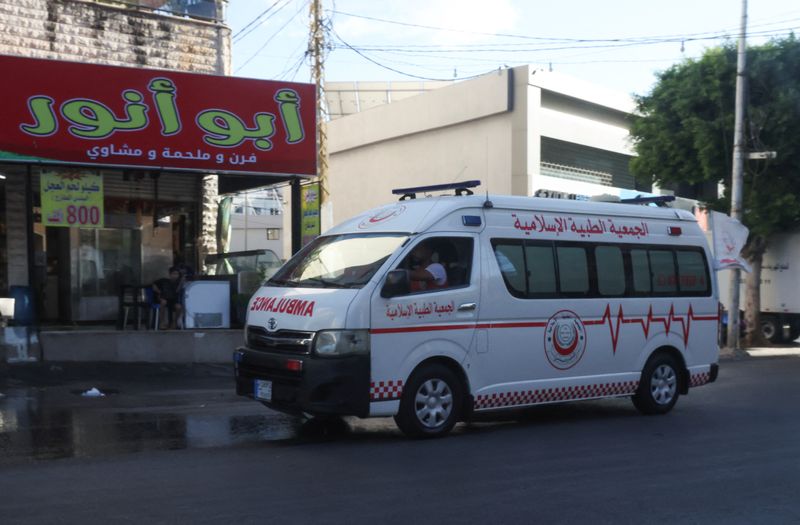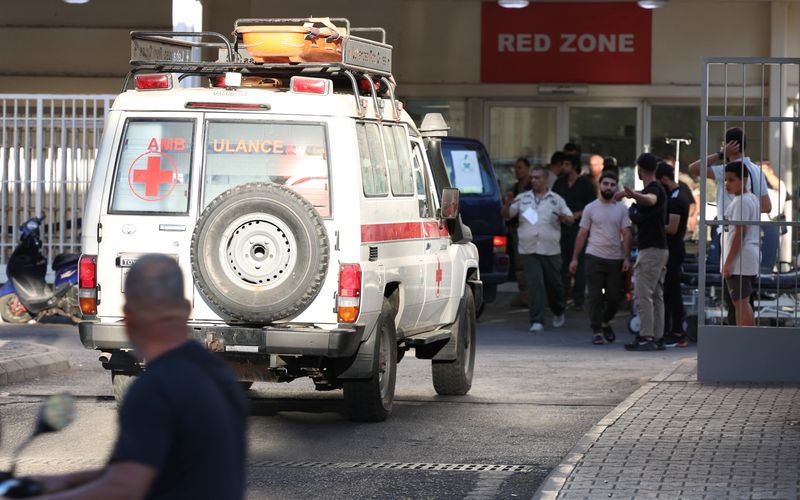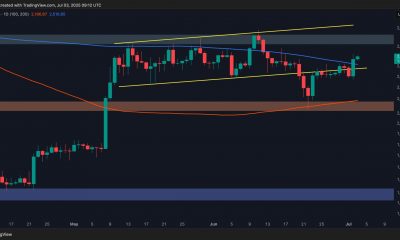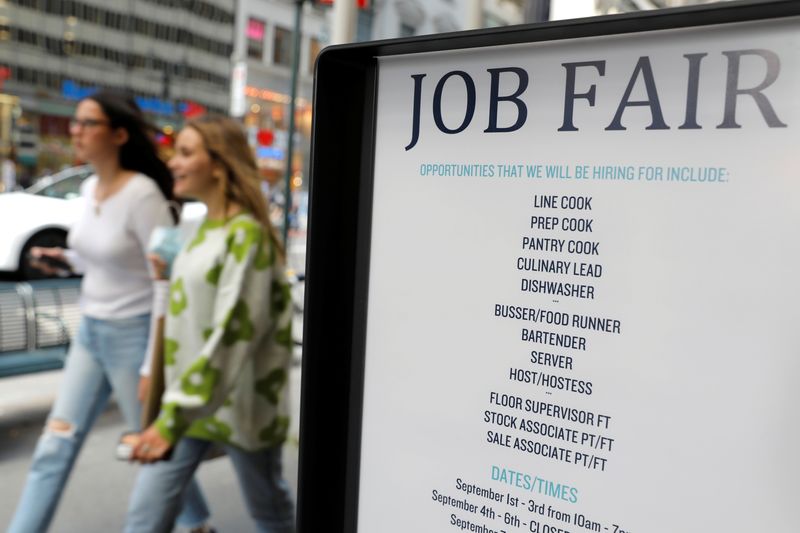Stock Markets
Hezbollah vows to punish Israel after pager blasts kill eight, injure thousands across Lebanon

By Laila Bassam
BEIRUT (Reuters) -Lebanon’s Hezbollah promised to retaliate after blaming Israel for detonating pagers on Tuesday that killed at least eight people and wounded 2,750 others, including many of the militant group’s fighters and Iran’s envoy to Beirut.
Lebanese Information Minister Ziad Makary condemned the detonation of the pagers – used by Hezbollah and others in Lebanon to communicate – as an “Israeli aggression”. Hezbollah said Israel would receive “its fair punishment” for the blasts.
The Israeli military, which has been engaged in cross-border warfare with Iran-backed Hezbollah since the start of the Gaza war last October, declined to respond to Reuters’ questions about the detonations.
A Hezbollah official, speaking on condition of anonymity, said the detonation of the pagers was the “biggest security breach” the group had been subjected to in nearly a year of conflict with Israel.
Developments in Lebanon are extremely concerning, especially given the “extremely volatile” context, said U.N. spokesperson Stephane Dujarric, adding that the U.N. deplores any civilian casualties.
Without commenting directly on the explosions in Lebanon, an Israeli military spokesman said the chief of staff, Major General Herzi Halevi, had met with senior officers on Tuesday evening to assess the situation. No policy change was announced but “vigilance must continue to be maintained”, he said.
Hezbollah earlier confirmed in a statement the deaths of at least two of its fighters in the explosions and said it was conducting an investigation into their causes.
Hezbollah fighters have been using pagers as a low-tech means to try and avoid Israeli tracking of their locations, two sources familiar with the group’s operations told Reuters earlier this year. A pager is a wireless telecommunications device that receives and displays messages.
The pagers were detonated in southern Lebanon, the southern suburbs of Beirut known as Dahiyeh and the eastern Bekaa valley – all Hezbollah strongholds.
MANY INJURED
Lebanese Health Minister Firass Abiad said 2,750 people had been wounded in the explosions, 200 of them critically.
Many of those hurt included Hezbollah fighters who are the sons of top officials from the armed group, two security sources told Reuters.
One of the fighters killed was the son of a Hezbollah member of the Lebanese parliament, Ali Ammar, they said.
“This is not a security targeting of one, two or three people. This is a targeting of an entire nation,” senior Hezbollah official Hussein Khalil said while paying his condolences for Ammar’s son.
Lebanese broadcaster Al Jadeed cited Ammar as saying what happened was an Israeli aggression. “We will deal with the enemy in the language it understands,” he added.
Tuesday’s blasts added to a hefty price already paid over the past year by Hezbollah, which has lost more than 400 of its fighters in Israeli strikes, including its top commander Fuad Shukr in July. Security sources in Lebanon said two more Hezbollah fighters were killed in an Israeli strike in southern Lebanon on Tuesday.
Iran’s ambassador to Lebanon, Mojtaba Amani, suffered a “superficial injury” in Tuesday’s pager blasts and is currently under observation in hospital, Iran’s semi-official Fars news agency said. Reuters could not immediately confirm the report.
There was no word from the Israeli government on the explosions.
Earlier on Tuesday, Israel’s domestic security agency said it had foiled a plot by Lebanese militant group Hezbollah to assassinate a former senior defence official in the coming days.
The Shin Bet agency, which did not name the official, said in a statement it had seized an explosive device attached to a remote detonation system, using a mobile phone and a camera that Hezbollah had planned to operate from Lebanon.
Shin Bet said the attempted attack was similar to a Hezbollah plot foiled in Tel Aviv a year ago, without giving further details.
Hezbollah has said it wants to avoid all-out conflict with Israel but that only an end to the Gaza war will stop the cross-border clashes. Gaza ceasefire efforts remain deadlocked after months of talks mediated by Qatar, Egypt and the United States.
SCREAMING IN PAIN
After Tuesday’s blasts, a Reuters journalist saw ambulances rushing through the southern suburbs of the capital Beirut, a Hezbollah stronghold, amid widespread panic. A security source said that devices were also exploding in the south of Lebanon.
At Mt. Lebanon hospital, a Reuters reporter saw motorcycles rushing to the emergency room, where people with their hands bloodied were screaming in pain.
The head of the Nabatieh public hospital in the south of the country, Hassan Wazni, told Reuters that around 40 wounded people were being treated at his facility. The wounds included injuries to the face, eyes and limbs.
Groups of people huddled at the entrance of buildings to check on people they knew who may have been wounded, the Reuters journalist said.
Regional broadcasters carrying CCTV footage which showed what appeared to be a small handheld device placed next to a grocery store cashier where an individual was paying spontaneously exploding.
Hezbollah fired missiles at Israel immediately after the Oct. 7 attacks by Hamas gunmen on Israel that triggered the Gaza war. Hezbollah and Israel have been exchanging fire constantly ever since, while avoiding a major escalation.

Tens of thousands of people have been displaced from towns and villages on both sides of the border by the hostilities.
On Tuesday, Israel added the safe return of its citizens forced to leave their homes near the border with Lebanon to its formal war goals.
Stock Markets
Ripple applies for US national bank charter as crypto eyes next frontier
Stock Markets
US job market surprises with increased openings in May
Stock Markets
Tesla, Palantir Lead Market Cap Stock Movers on Tuesday

 Forex3 years ago
Forex3 years agoForex Today: the dollar is gaining strength amid gloomy sentiment at the start of the Fed’s week

 Forex3 years ago
Forex3 years agoUnbiased review of Pocket Option broker

 Forex3 years ago
Forex3 years agoDollar to pound sterling exchange rate today: Pound plummeted to its lowest since 1985

 Forex3 years ago
Forex3 years agoHow is the Australian dollar doing today?

 Cryptocurrency3 years ago
Cryptocurrency3 years agoWhat happened in the crypto market – current events today

 World3 years ago
World3 years agoWhy are modern video games an art form?

 Commodities3 years ago
Commodities3 years agoCopper continues to fall in price on expectations of lower demand in China

 Economy3 years ago
Economy3 years agoCrude oil tankers double in price due to EU anti-Russian sanctions































